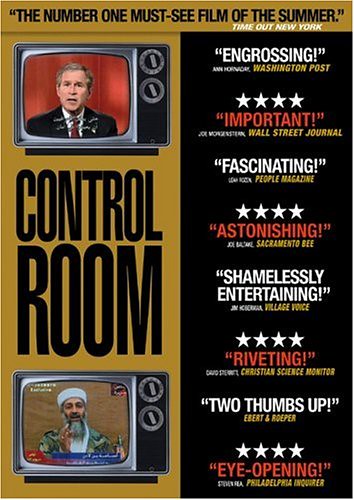Control Room * * *
 Control Room is a documentary on the Al Jazeera news station from just before the invasion of Iraq to right after the fall of Baghdad. We start with one of the lead journalists in his car in Iraq (I think), and he is talking about his incredulity about the impending war. The style continues like this as a fly-on-the-wall view of mainly Al Jazeera journalists, the US PR fellow, and the Al Jazeera chief, as to what they are thinking and feeling as the war unfolds. All these people are well-educated, erudite, and earnest. I was fascinated while listening to them give their personal impressions of what they are seeing on the TV or what they are reporting about right at that moment.
Control Room is a documentary on the Al Jazeera news station from just before the invasion of Iraq to right after the fall of Baghdad. We start with one of the lead journalists in his car in Iraq (I think), and he is talking about his incredulity about the impending war. The style continues like this as a fly-on-the-wall view of mainly Al Jazeera journalists, the US PR fellow, and the Al Jazeera chief, as to what they are thinking and feeling as the war unfolds. All these people are well-educated, erudite, and earnest. I was fascinated while listening to them give their personal impressions of what they are seeing on the TV or what they are reporting about right at that moment.  The Al Jazeera chief is especially intriquing. Very sharp guy and very charismatic -- in a way that probably will be surprising for an American. At least it was surprising for this American. As the war proceeds, the Al Jazeera journalists and chief are visibly becoming more and more tired. They haven't slept for days. The day that the US arrives into Baghdad, we see the bombing of the building from where Al Jazeera is broadcasting. It's very sad, as one of the journalists is killed. The Al Jazeera folks are very affected, as you would expect, and basically you are watching as they find out what happened and then talking sort of woodenly about it and not really being able to comprehend it. The documentary ends as we watch the statue of Sadaam being taken down. The Al Jazeera journalists are watching and are dumbfounded -- 'Where is the Iraq Army? This is so embarassing...."
The Al Jazeera chief is especially intriquing. Very sharp guy and very charismatic -- in a way that probably will be surprising for an American. At least it was surprising for this American. As the war proceeds, the Al Jazeera journalists and chief are visibly becoming more and more tired. They haven't slept for days. The day that the US arrives into Baghdad, we see the bombing of the building from where Al Jazeera is broadcasting. It's very sad, as one of the journalists is killed. The Al Jazeera folks are very affected, as you would expect, and basically you are watching as they find out what happened and then talking sort of woodenly about it and not really being able to comprehend it. The documentary ends as we watch the statue of Sadaam being taken down. The Al Jazeera journalists are watching and are dumbfounded -- 'Where is the Iraq Army? This is so embarassing...."I found Control Room a very interesting documentary. You basically have a bunch of intelligent and interesting people talking about their experience and interpretation of the Iraq War as it's happening. I did not find the documentary biased itself. Of course, the Al Jazeera journalists and chief are biased -- they say so themselves, but also argue that everyone is. How can you not be? I thought that was a specious argument since the point was they are VERY biased as opposed to not so very biased, but anyhow.... But the documentary itself did not seem to take their side or anyone's side.
 The US Army PR guy actually comes across very well: intelligent, honest, sincere, and compassionate, while at the same time holding his ground against the Al Jazeera journalists who argued that the US Army was invading Iraq to take over Iraq. Interestingly, I found I related most to this US Army PR guy. He had his own views, but he understood that the Al Jazeera journalists interviewing him had different views and different life experiences and he wanted to understand why their views were so different. For example, one of the things he mentioned was that Arabs he talked to always linked the Iraq War to Palestine, whereas an American never would. He talked about how it made him feel awful and ashamed that he was more affected by seeing the pictures of dead American soldiers on Al Jazeera than the pictures of dead Iraqis.
The US Army PR guy actually comes across very well: intelligent, honest, sincere, and compassionate, while at the same time holding his ground against the Al Jazeera journalists who argued that the US Army was invading Iraq to take over Iraq. Interestingly, I found I related most to this US Army PR guy. He had his own views, but he understood that the Al Jazeera journalists interviewing him had different views and different life experiences and he wanted to understand why their views were so different. For example, one of the things he mentioned was that Arabs he talked to always linked the Iraq War to Palestine, whereas an American never would. He talked about how it made him feel awful and ashamed that he was more affected by seeing the pictures of dead American soldiers on Al Jazeera than the pictures of dead Iraqis.I had a hard time wrapping my head around the viewpoint of the Al Jazeera journalists and the other journalists too at times. I got the impression they wanted the Army to pinpoint troop locations for them to publish, and they were annoyed that the Army was being vague and probably even intentionally misleading them about troop locations. I was also frustrated that the Al Jazeera journalists could never allow that maybe Sadaam was a bad guy and that lots of Iraqis wouldn't like him. Their view was solidly that this was an occupying invasion. While I understand that view, I also felt like they put one spin on the stories and didn't address the going from the 'frying pan' into the 'fire' aspect (or the other way around, which is what the Army PR guy might have reasoned). War is awful. That is what Al Jazeera was clearly showing very graphically. The Army PR guy would have agreed, but he would probably argue that to get to something better, a war is necessary even if it is awful. That issue wasn't directly discussed by the Al Jazeera journalists, and the documentary would have been much more interesting if they had. Maybe they would say they felt war is never justified or at least, occupation is never justified. This is a defensible position, but they are never asked so we don't know. But then I suppose they might counter that that is beside the point. The real point is that we don't experience the real price and misery of war, and so we don't rightly put enough cost on that.
Bottom-line: I recommend this to anyone interested in listening to a group of moderate, well-educated Arabs talk about their views on the eve of the Iraq war.
Labels: documentary, Iraq

<< Home